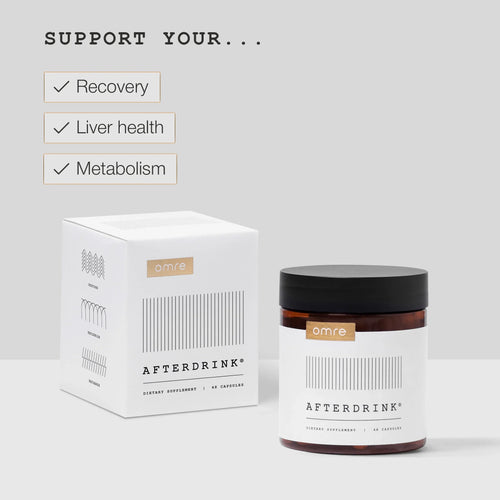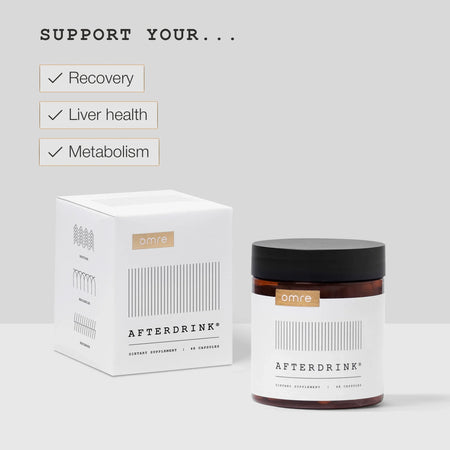Table of Contents
There are lots of people that wake up after a night out and drop an effervescent vitamin C tablet in water to drink as a remedy for hangovers.
But does vitamin C really have any benefits for a hangover?
If you’ve landed on this article, you’ve probably tried a few supposed hangover cures but nothing worked that well. Well, you’re not alone. There are so many hangover cure myths that it’s hard to separate the facts from the fads.
In this article, we’re going to cover everything you need to know about Vitamin C and how it’s used by your body. More specifically, we’re going to look at whether it has any role in alcohol metabolism and hangover recovery.
Afterdrink®
A supercharged antioxidant designed to support recovery, made from the very best, research-backed ingredients on the market.*
What does Vitamin C do?
Most people think of immune health when you mention Vitamin C, but it actually has many other important biological functions.
Vitamin C is an essential nutrient that is obtained purely through your diet. This means your body is unable to produce Vitamin C and you can become deficient if you don’t eat enough.(1)
Citrus fruits, berries, tomatoes, potatoes, and green leafy vegetables are excellent sources of vitamin C.
When you mention Vitamin C, most people immediately think of the immune system. And although it is important for immune health, it has other major functions including collagen synthesis and antioxidation.
Connective tissue
Vitamin C is vital for the normal production of collagen which makes up your connective tissues. “Connective tissue” is the term used to describe the scaffolding that holds your body together. This includes your skin, bones, gums, and organs to mention a few.
As a result, severe Vitamin C deficiency leads to a condition called Scurvy which presents with bone pain, bleeding gums, easy bruising, and poor wound healing.
Antioxidant
Did you know that Vitamin C is also a powerful antioxidant?
It’s actually one of the lesser-known facts about this vitamin and is responsible for many of its health benefits.(2)
Antioxidants neutralize “free-radicals” which are produced as by-products of metabolism.
Free radicals are charged particles that damage the cells they come into contact with causing inflammation. They are in some way or another involved in all inflammatory diseases such as heart disease, arthritis, and dementia.(3)
Causes of a hangover
To see whether vitamin C helps hangovers, we first need to go over how alcohol affects your body.
The science of hangovers isn’t simple. There are several different factors that cause your typical hangover symptoms including, nausea, headache, muscle aches, anxiety, and dry mouth.
1. Dehydration
Alcohol is a diuretic which means it makes your kidneys flush out extra water. It's because alcohol blocks the release of a hormone in your brain called vasopressin which is responsible for the regulation of water. As a result, drinking too much alcohol can cause dehydration which is one of the causes of a hangover.
2. Inflammation
When alcohol is metabolized (broken down) in your liver, acetaldehyde is formed as one of the by-products. Acetaldehyde is a toxic compound that breaks down to form free radicals. We mentioned earlier that free radicals are charged particles that react with your cells causing inflammation. And this inflammatory process is thought to be a contributing factor in hangover symptoms.
3. Sleep disturbance
Alcohol significantly reduces your sleep quality. It does this by blocking your brain from reaching the “REM” stage. REM sleep is where dreams happen and is essential for waking up fully rested. That’s why you may have noticed that you wake up easy and still feel tired in the morning after drinking.
Does Vitamin C help hangovers?
Vitamin C might theoretically support the body’s natural defenses due to its antioxidant properties, which could counteract some effects of alcohol. However, there is no direct evidence that it helps with hangovers or reduces liver inflammation in humans.
Can vitamin C help counteract the effects of alcohol? It’s unlikely for a single vitamin to achieve this.
Some research suggests vitamin C’s antioxidant properties might reduce liver inflammation. A study found vitamin C reduced oxidative stress and liver damage in alcohol-exposed rats. (5)
However, these findings haven’t been confirmed in humans, and no studies specifically link vitamin C to hangover relief. While it may support natural defenses, there’s no evidence to prove it works as a hangover remedy.
Afterdrink®
A supercharged antioxidant designed to support recovery, made from the very best, research-backed ingredients on the market.*
Vitamin C and alcohol metabolism
There are a lot of myths regarding Vitamin C when it comes to alcohol and hangovers.
Firstly Vitamin C is not involved in alcohol metabolism and, therefore, will not speed up how fast alcohol is broken down.
Secondly, for the healthy individual who drinks socially, alcohol does not deplete Vitamin C levels.
On the other hand, chronic alcohol use is a risk factor for Vitamin C deficiency. The cause for this is not fully understood but it’s thought to be a combination of poor nutrition, liver inflammation, and reduced absorption from the gut. (4)
Vitamin C does not speed up alcohol metabolism.
Can you take Vitamin C with alcohol?
Because Vitamin C is a water-soluble vitamin, anything that’s unused by your body is flushed out via your kidneys.
Vitamin C is generally well-tolerated with minimal side effects in most people. It’s safe to take with alcohol and there are no negative interactions between the two.
Can I take Vitamin C after drinking alcohol?
You can take vitamin C after drinking alcohol, as it is generally safe and may support your body’s natural defenses due to its antioxidant properties. However, there is no scientific evidence that it directly alleviates hangover symptoms or counteracts alcohol's effects.
Anything else to think about?
Hangovers are a sign from your body that you’ve had more than your liver can handle. You only get hangover symptoms if drinking over your limits and the symptoms are caused by a combination of dehydration, poor sleep quality, and inflammation.
The best way to “cure” a hangover is by preventing it from happening in the first place. Drinking within your limits, keeping well hydrated, and eating a meal before going out are all it takes to prevent the worst hangovers.
Aside from this, you could also try avoiding darker-colored drinks such as whiskey and red wine. The reason is that darker-colored drinks contain a higher concentration of congeners. And these have been shown in studies to make hangovers a lot worse. You can read more about this in our article about congeners.
Vitamin C for hangovers – Final verdict
That brings us to the end of our look into whether Vitamin C is good for hangovers. Currently, there are no studies that have shown that it’s beneficial for hangover prevention or recovery. It’s also certainly not a magic cure and has no impact on alcohol metabolism.
With that said, it’s an antioxidant vitamin that could help support your body’s natural defenses against free radicals.
If you’re interested in whether other vitamins are good for hangovers, check out our article on the best hangover vitamins.





